- Home
- W. Somerset Maugham
Cosmopolitans Page 2
Cosmopolitans Read online
Page 2
Mayhew was no hypocrite and he made no secret of the fact that he would never have done so wild a thing if he had been sober, but when he was he did not regret it. He was neither an impulsive nor an emotional man, but a very honest and sincere one. He would never have continued from bravado in a course that he had come to the conclusion was unwise. He made up his mind to do cxactly as he had said. He did not care for wealth and he had enough money on which to live in Italy. He thought he could do more with life than spend it on composing the trivial quarrels of unimportant people. He had no definite plan. He merely wanted to get away from a life that had given him all it had to offer. I suppose his friends thought him crazy; some must have done all they could to dissuade him. He arranged his affairs, packed up his furniture and started.
Capri is a gaunt rock of austere outline, bathed in a deep blue sea; but its vineyards, green and smiling, give it a soft and easy grace. It is friendly, remote and debonair. I find it strange that Mayhew should have settled on this lovely island, for I never knew a man more insensible to beauty. I do not know what he sought there: happiness, freedom, or merely leisure; I know what he found. In this place which appeals so extravagantly to the senses he lived a life entirely of the spirit. For the island is rich with historic associations and over it broods always the enigmatic memory of Tiberius the Emperor. From his windows which overlooked the Bay of Naples, with the noble shape of Vesuvius changing in colour with the changing light, Mayhew saw a hundred places that recalled the Romans and the Greeks. The past began to haunt him. All that he saw for the first time, for he had never been abroad before, excited his fancy; and in his soul stirred the creative imagination. He was a man of energy. Presently he made up his mind to write a history. For some time he looked about for a subject, and at last decided on the second century of the Roman Empire. It was little known and it seemed to him to offer problems analogous with those of our own day.
He began to collect books and soon he had an immense library. His legal training had taught him to read quickly. He settled down to work. At first he had been accustomed to foregather in the evening with the painters, writers and such like who met in the little tavern near the piazza, but presently he withdrew himself, for his absorption in his studies became more pressing. He had been accustomed to bathe in that bland sea and to take long walks among the pleasant vineyards, but little by little, grudging the time, he ceased to do so. He worked harder than he had ever worked in Detroit. He would start at noon and work all through the night till the whistle of the steamer that goes every morning from Capri to Naples told him that it was five o’clock and time to go to bed. His subject opened out before him, vaster and more significant, and he imagined a work that would put him for ever beside the great historians of the past. As the years went by he was to be found seldom in the haunts of men. He could be tempted to come out of his house only by a game of chess or the chance of an argument. He loved to set his brain against another’s. He was widely read now, not only in history, but in philosophy and science; and he was a skilful controversialist, quick, logical and incisive. But he had good-humour and kindliness; though he took a very human pleasure in victory, he did not exult in it to your mortification.
When first he came to the island he was a big, brawny fellow, with thick black hair and a black beard, of a powerful physique; but gradually his skin became pale and waxy; he grew thin and frail. It was an odd contradiction in the most logical of men that, though a convinced and impetuous materialist, he despised the body; he looked upon it as a vile instrument which he could force to do the spirit’s bidding. Neither illness nor lassitude prevented him from going on with his work. For fourteen years he toiled unremittingly. He made thousands and thousands of notes. He sorted and classified them. He had his subject at his finger ends, and at last was ready to begin. He sat down to write.
He died.
The body that he, the materialist, had treated so contumeliously took its revenge on him.
That vast accumulation of knowledge is lost for ever. Vain was that ambition, surely not an ignoble one, to set his name beside those of Gibbon and Mommsen. His memory is treasured in the hearts of a few friends, fewer, alas! as the years pass on, and to the world he is unknown in death as he was in life.
And yet to me his life was a success. The pattern is good and complete. He did what he wanted, and he died when his goal was in sight and never knew the bitterness of an end achieved.
GERMAN HARRY
I WAS IN Thursday Island and I wanted very much to go to New Guinea. Now the only way in which I could do this was by getting a pearling lugger to take me across the Arafura Sea. The pearl fishery at that time was in a bad way and a flock of neat little craft lay anchored in the harbour. I found a skipper with nothing much to do (the journey to Merauke and back could hardly take him less than a month) and with him I made the necessary arrangements. He engaged four Torres Straits islanders as crew (the boat was but nineteen tons) and we ransacked the local store for canned goods. A day or two before I sailed a man who owned a number of pearlers came to me and asked whether on my way I would stop at the island of Trebucket and leave a sack of flour, another of rice, and some magazines for the hermit who lived there.
I pricked up my ears. It appeared that the hermit had lived by himself on this remote and tiny island for thirty years, and when opportunity occurred provisions were sent to him by kindly souls. He said that he was a Dane, but in the Torres Straits he was known as German Harry. His history went back a long way. Thirty years before, he had been an able seaman on a sailing vessel that was wrecked in those treacherous waters. Two boats managed to get away and eventually hit upon the desert island of Trebucket. This is well out of the line of traffic and it was three years before any ship sighted the castaways. Sixteen men had landed on the island, but when at last a schooner, driven from her course by stress of weather, put in for shelter, no more than five were left. When the storm abated the skipper took four of these on board and eventually landed them at Sydney. German Harry refused to go with them. He said that during those three years he had seen such terrible things that he had a horror of his fellow men and wished never to live with them again. He would say no more. He was absolutely fixed in his determination to stay, entirely by himself, in that lonely place. Though now and then opportunity had been given him to leave he had never taken it.
A strange man and a strange story. I learned more about him as we sailed across the desolate sea. The Torres Straits arc peppered with islands and at night we anchored on the lea of one or other of them. Of late new pearling grounds have been discovered near Trebucket and in the fall pearlers, visiting it now and then, have given German Harry various necessities so that he has been able to make himself sufficiently comfortable. They bring him papers, bags of flour and rice, and canned meats. He has a whale boat and used to go fishing in it, but now he is no longer strong enough to manage its unwieldy bulk. There is abundant pearl shell on the reef that surrounds his island and this he used to collect and sell to the pearlers for tobacco, and sometimes he found a good pearl for which he got a considerable sum. It is believed that he has, hidden away somewhere, a collection of magnificent pearls. During the war no pearlers came out and for years he never saw a living soul. For all he knew a terrible epidemic had killed off the entire human race and he was the only man alive. He was asked later what he thought.
“I thought something had happened,” he said.
He ran out of matches and was afraid that his fire would go out, so he only slept in snatches, putting wood on his fire from time to time all day and all night. He came to the end of his provisions and lived on chickens, fish and coconuts. Sometimes he got a turtle.
During the last four months of the year there may be two or three pearlers about and not infrequently after the day’s work they will row in and spend an evening with him. They try to make him drunk and then they ask him what happened during those three years after the two boatloads came to the island. How was it that sixteen la
nded and at the end of that time only five were left? He never says a word. Drunk or sober he is equally silent on that subject and if they insist grows angry and leaves them.
I forget if it was four or five days before we sighted the hermit’s little kingdom. We had been driven by bad weather to take shelter and had spent a couple of days at an island on the way. Trebucket is a low island, perhaps a mile round, covered with coconuts, just raised above the level of the sea and surrounded by a reef so that it can be approached only on one side. There is no opening in the reef and the lugger had to anchor a mile from the shore. We got into a dinghy with the provisions. It was a stiff pull and even within the reef the sea was choppy. I saw the little hut, sheltered by trees, in which German Harry lived, and as we approached he sauntered down slowly to the water’s edge. We shouted a greeting, but he did not answer. He was a man of over seventy, very bald, hatchet faced, with a grey beard, and he walked with a roll so that you could never have taken him for anything but a seafaring man. His sunburn made his blue eyes look very pale and they were surrounded by wrinkles as though for long years he had spent interminable hours scanning the vacant sea. He wore dungarees and a singlet, patched, but neat and clean. The house to which he presently led us consisted of a single room with a roof of corrugated iron. There was a bed in it, some rough stools which he himself had made, a table, and his various household utensils. Under a tree in front of it were a table and a bench. Behind was an enclosed run for his chickens.
I cannot say that he was pleased to see us. He accepted our gifts as a right, without thanks, and grumbled a little because something or other he needed had not been brought. He was silent and morose. He was not interested in the news we had to give him, for the outside world was no concern of his: the only thing he cared about was his island. He looked upon it with a jealous, proprietary right; he called it “my health resort” and he feared that the coconuts that covered it would tempt some enterprising trader. He looked at me with suspicion. He was sombrely curious to know what I was doing in these seas. He used words with difficulty, talking to himself rather than to us, and it was a little uncanny to hear him mumble away as though we were not there. But he was moved when my skipper told him that an old man of his own age whom he had known for a long time was dead.
“Old Charlie dead—that’s too bad. Old Charlie dead.”
He repeated it over and over again. I asked him if he read.
“Not much,” he answered indifferently.
He seemed to be occupied with nothing but his food, his dogs and his chickens. If what they tell us in books were true his long communion with nature and the sea should have taught him many subtle secrets. It hadn’t. He was a savage. He was nothing but a narrow, ignorant and cantankerous seafaring man. As I looked at the wrinkled, mean old face I wondered what was the story of those three dreadful years that had made him welcome this long imprisonment. I sought to see behind those pale blue eyes of his what secrets they were that he would carry to his grave. And then I foresaw the end. One day a pearl fisher would land on the island and German Harry would not be waiting for him, silent and suspicious, at the water’s edge. He would go up to the hut and there, lying on the bed, unrecognizable, he would see all that remained of what had once been a man. Perhaps then he would hunt high and low for the great mass of pearls that has haunted the fancy of so many adventurers. But I do not believe he would find it: German Harry would have seen to it that none should discover the treasure, and the pearls would rot in their hiding place. Then the pearl fisher would get back into his dinghy and the island once more be deserted of man.
THE HAPPY MAN
IT IS A DANGEROUS THING to order the lives of others and I have often wondered at the self-confidence of politicians, reformers and such like who are prepared to force upon their fellows measures that must alter their manners, habits and points of view. I have always hesitated to give advice, for how can one advise another how to act unless one knows that other as well as one knows oneself? Heavens knows, I know little enough of myself: I know nothing of others. We can only guess at the thoughts and emotions of our neighbours. Each one of us is a prisoner in a solitary tower and he communicates with the other prisoners, who form mankind, by conventional signs that have not quite the same meaning for them as for himself. And life, unfortunately, is something that you can lead but once; mistakes are often irreparable, and who am I that I should tell this one and that how he should lead it? Life is a difficult business and I have found it hard enough to make my own a complete and rounded thing; I have not been tempted to teach my neighbour what he should do with his. But there are men who flounder at the journey’s start, the way before them is confused and hazardous, and on occasion, however unwillingly, I have been forced to point the finger of fate. Sometimes men have said to me, what shall I do with my life? and I have seen myself for a moment wrapped in the dark cloak of Destiny.
Once I know that I advised well.
I was a young man and I lived in a modest apartment in London near Victoria Station. Late one afternoon, when I was beginning to think that I had worked enough for that day, I heard a ring at the bell. I opened the door to a total stranger. He asked me my name; I told him. He asked if he might come in.
“Certainly.”
I led him into my sitting-room and begged him to sit down. He seemed a trifle embarrassed. I offered him a cigarette and he had some difficulty in lighting it without letting go of his hat. When he had satisfactorily achieved this feat I asked him if I should not put it on a chair for him. He quickly did this and while doing it dropped his umbrella.
“I hope you don’t mind my coming to see you like this,” he said. “My name is Stephens and I am a doctor. You’re in the medical, I believe?”
“Yes, but I don’t practise.”
“No, I know. I’ve just read a book of yours about Spain and I wanted to ask you about it.”
“It’s not a very good book, I’m afraid.”
“The fact remains that you know something about Spain and there’s no one else I know who does. And I thought perhaps you wouldn’t mind giving me some information.”
“I shall be very glad.”
He was silent for a moment. He reached out for his hat and holding it in one hand absentmindedly stroked it with the other. I surmised that it gave him confidence.
“I hope you won’t think it very odd for a perfect stranger to talk to you like this.” He gave an apologetic laugh. “I’m not going to tell you the story of my life.”
When people say this to me I always know that it is precisely what they are going to do. I do not mind. In fact I rather like it.
“I was brought up by two old aunts. I’ve never been anywhere. I’ve never done anything. I’ve been married for six years. I have no children. I’m medical officer at the Camberwell Infirmary. I can’t stick it any more.”
There was something very striking in the short, sharp sentences he used. They had a forcible ring. I had not given him more than a cursory glance, but now I looked at him with curiosity. He was a little man, thickset and stout, of thirty perhaps, with a round red face from which shone small, dark and very bright eyes. His black hair was cropped close to a bullet-shaped head. He was dressed in a blue suit a good deal the worse for wear. It was baggy at the knees and the pockets bulged untidily.
“You know what the duties are of a medical officer in an infirmary. One day is pretty much like another. And that’s all I’ve got to look forward to for the rest of my life. Do you think it’s worth it?” “It’s a means of livelihood,” I answered.
“Yes, I know. The money’s pretty good.”
“I don’t exactly know why you’ve come to me.” “Well, I wanted to know whether you thought there would be any chance for an English doctor in Spain?”
“Why Spain?”
“I don’t know, I just have a fancy for it.”
“It’s not like Carmen, you know,” I smiled. “But there’s sunshine there, and there’s good wine, and there’
s colour, and there’s air you can breathe. Let me say what I have to say straight out. I heard by accident that there was no English doctor in Seville. Do you think I could earn a living there? Is it madness to give up a good safe job for an uncertainty?”
“What does your wife think about it?”
“She’s willing.”
“It’s a great risk.”
“I know. But if you say take it, I will: if you say stay where you are, I’ll stay.”
He was looking at me intently with those bright dark eyes of his and I knew that he meant what he said. I reflected for a moment.
“Your whole future is concerned: you must decide for yourself. But this I can tell you : if you don’t want money but are content to earn just enough to keep body and soul together, then go. For you will lead a wonderful life.”
He left me, I thought about him for a day or two, and then forgot. The episode passed completely from my memory.
Many years later, fifteen at least, I happened to be in Seville and having some trifling indisposition asked the hotel porter whether there was an English doctor in the town. He said there was and gave me the address. I took a cab and as I drove up to the house a little fat man came out of it. He hesitated when he caught sight of me.
“Have you come to see me?” he said. “I’m the English doctor.”
I explained my errand and he asked me to come in. He lived in an ordinary Spanish house, with a patio, and his consulting room which led out of it was littered with papers, books, medical appliances and lumber. The sight of it would have startled a squeamish patient. We did our business and then I asked the doctor what his fee was. He shook his head and smiled.
“There’s no fee.”
“Why on earth not?”
“Don’t you remember me? Why, I’m here because of something you said to me. You changed my whole life for me. I’m Stephens.”

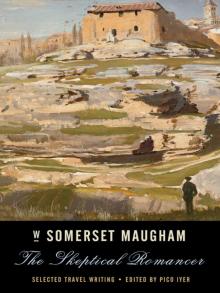 The Skeptical Romancer: Selected Travel Writing
The Skeptical Romancer: Selected Travel Writing The Summing Up
The Summing Up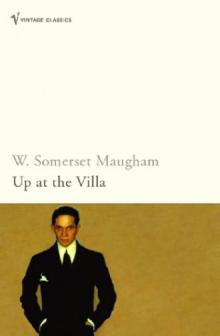 Up at the Villa
Up at the Villa The Razor's Edge
The Razor's Edge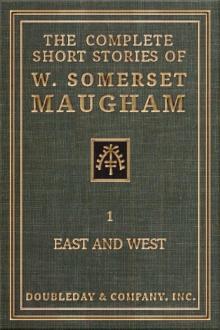 The Complete Short Stories of W. Somerset Maugham: East and West (Vol. 1 of 2))
The Complete Short Stories of W. Somerset Maugham: East and West (Vol. 1 of 2))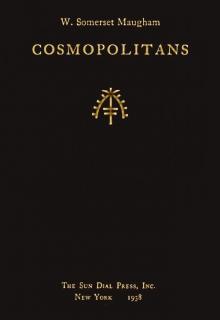 Cosmopolitans
Cosmopolitans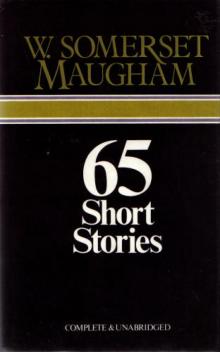 65 Short Stories
65 Short Stories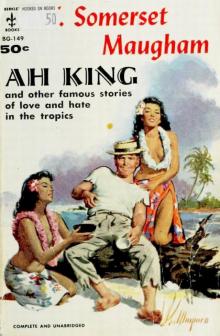 Ah King (Works of W. Somerset Maugham)
Ah King (Works of W. Somerset Maugham)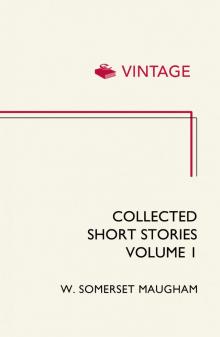 Collected Short Stories: Volume 1
Collected Short Stories: Volume 1 Collected Short Stories Volume 2
Collected Short Stories Volume 2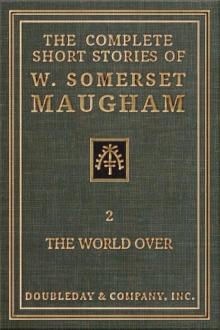 The Complete Short Stories of W. Somerset Maugham - II - The World Over
The Complete Short Stories of W. Somerset Maugham - II - The World Over Collected Short Stories Volume 4
Collected Short Stories Volume 4 Theatre
Theatre Short Stories
Short Stories Then and Now
Then and Now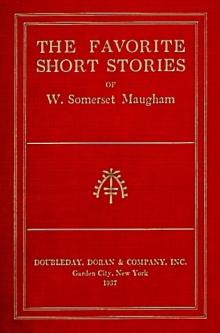 The Favorite Short Stories of W. Somerset Maugham
The Favorite Short Stories of W. Somerset Maugham Of Human Bondage
Of Human Bondage The Magician
The Magician The Great Exotic Novels and Short Stories of Somerset Maugham
The Great Exotic Novels and Short Stories of Somerset Maugham A Writer's Notebook
A Writer's Notebook Christmas Holiday
Christmas Holiday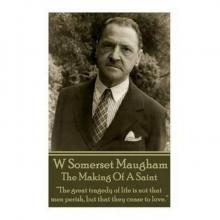 The Making of a Saint
The Making of a Saint Merry Go Round
Merry Go Round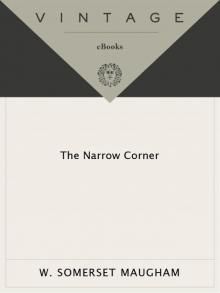 The Narrow Corner
The Narrow Corner Collected Short Stories Volume 3
Collected Short Stories Volume 3 Ten Novels and Their Authors
Ten Novels and Their Authors Ashenden
Ashenden The Moon and Sixpence
The Moon and Sixpence Cakes and Ale
Cakes and Ale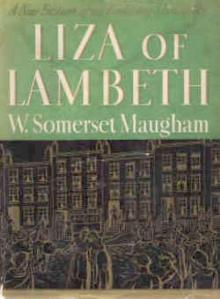 Liza of Lambeth
Liza of Lambeth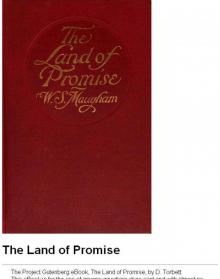 The Land of Promise: A Comedy in Four Acts (1922)
The Land of Promise: A Comedy in Four Acts (1922) A Writer's Notebook (Vintage International)
A Writer's Notebook (Vintage International)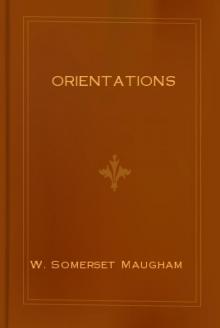 Orientations
Orientations Selected Masterpieces
Selected Masterpieces Mrs Craddock
Mrs Craddock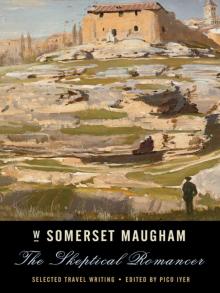 The Skeptical Romancer
The Skeptical Romancer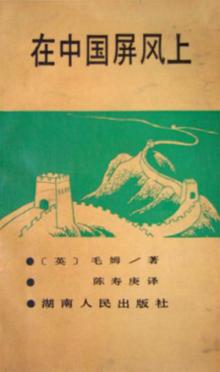 On a Chinese Screen
On a Chinese Screen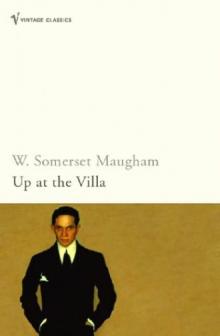 (1941) Up at the Villa
(1941) Up at the Villa The Great Novels and Short Stories of Somerset Maugham
The Great Novels and Short Stories of Somerset Maugham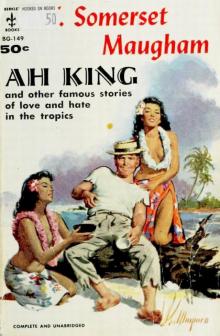 Ah King
Ah King The Explorer
The Explorer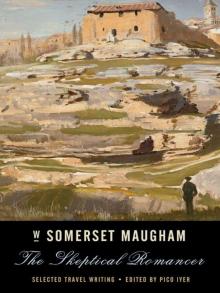 The Skeptical Romancer: Selected Travel Writing (Vintage Departures)
The Skeptical Romancer: Selected Travel Writing (Vintage Departures)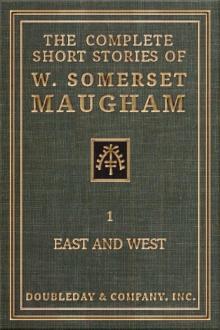 The Complete Short Stories of W. Somerset Maugham - I - East and West
The Complete Short Stories of W. Somerset Maugham - I - East and West